Services
London
+) 22 256 7890
architecture@hub.com
Info
+) 22 256 7890
architecture@hub.com
Find Us
290 Maryam Springs 260,
Courbevoie, Paris, France
Social
- Medium
+) 22 256 7890
architecture@hub.com
+) 22 256 7890
architecture@hub.com
290 Maryam Springs 260,
Courbevoie, Paris, France
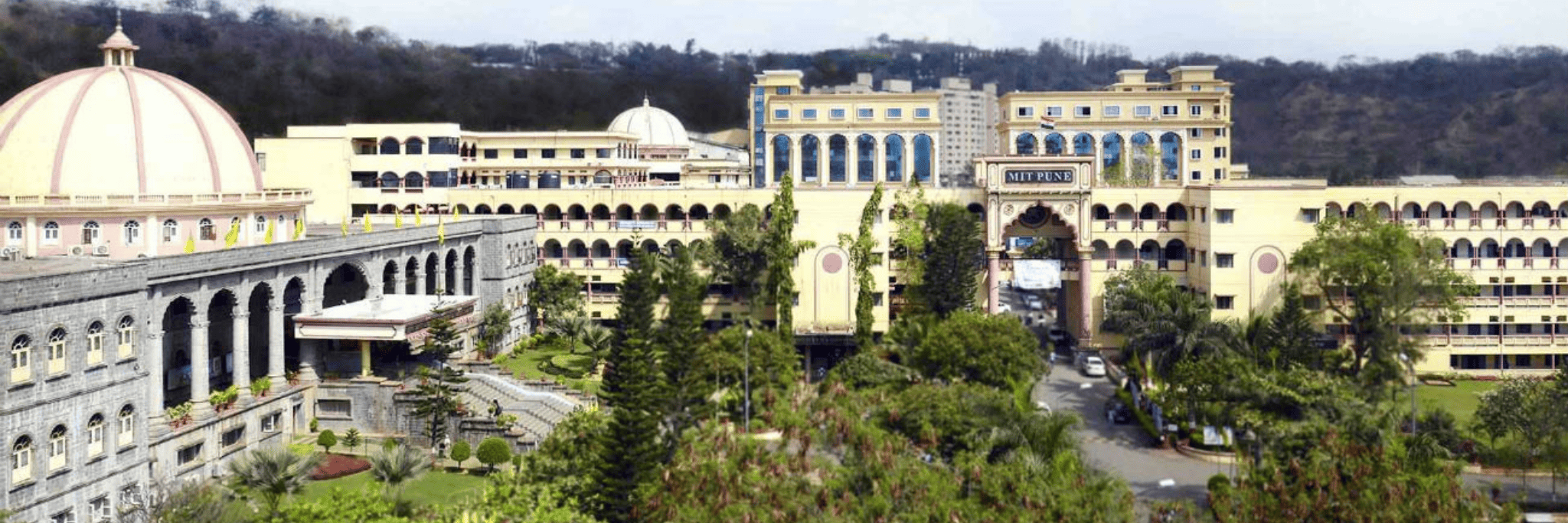
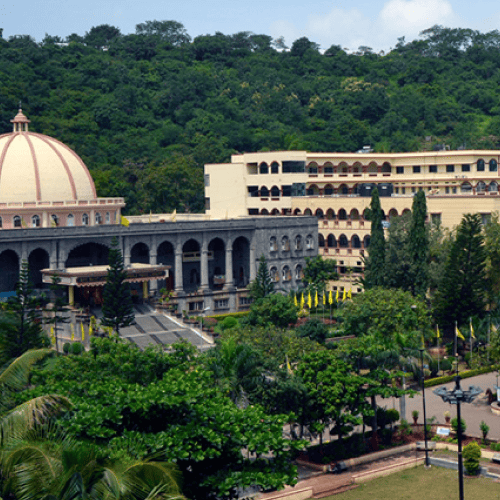
The MIT School of Government (MIT-SOG) is a visionary initiative founded by Shri Rahul V. Karad, Executive President of Dr Vishwanath Karad MIT World Peace University. This first-of-its-kind institution was established in 2005 to create ethical, motivated, and committed political leaders for the country from diverse backgrounds. The program offers a two-year Master’s degree in Political Leadership & Government (MPG) and a BA Honours in Government & Administration.
Emphasising on experiential learning, the first year of MIT-SOG’s Master’s program is focused on campus-based education. Including lectures by core and visiting faculty members, and experts from various fields such as politics, social work, bureaucracy, the judiciary, media, and the corporate sector. Additionally, students participate in field visits and study tours.
In the second year, students receive training and engage in internships in various areas, including constituency-based, issue-based, NGO-based, and media work, and final career-based internships with political leaders and parties.
The overarching aim of MIT-SOG is to promote a culture of peace through value-based education and to nurture global competency among students. Shri Rahul V. Karad founded the institution to build the nation and produce well-rounded and capable political leaders.
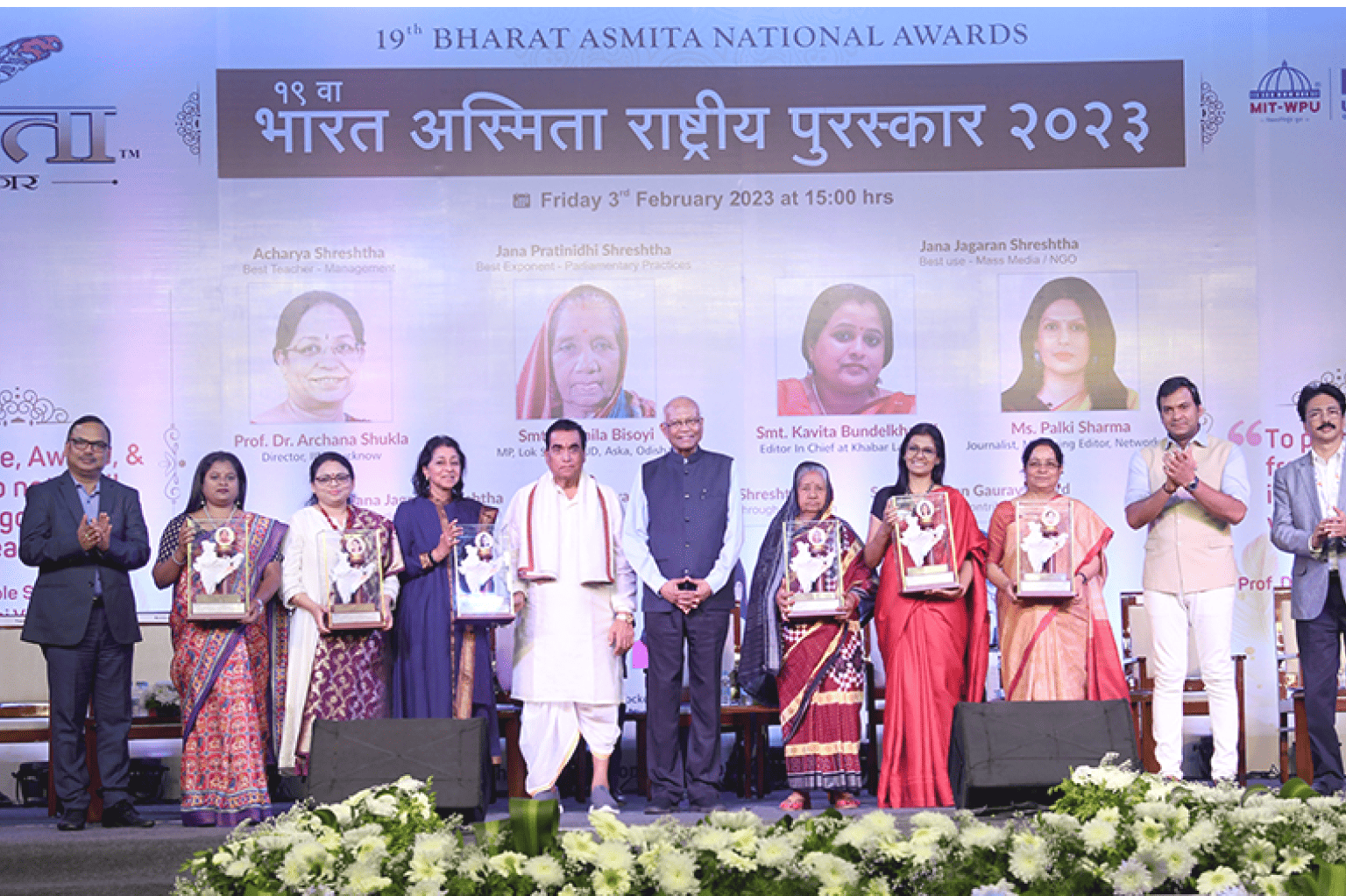
National Legislators’ Conference Bharat (NLC Bharat) is an avenue for Members of Legislative Assemblies (MLAs) and Members of Legislative Councils (MLCs) across the nation to gather in one place and exchange ideas in this historic conference. Hon’ble Speakers of Lok Sabha (Former) and current Speakers of Legislative Assemblies came together to build this conference, the first edition of which, took place in Mumbai from 15th to 17th June 2023.
MLAs and MLCs got a unique opportunity to interact with a diverse group of legislators from all states and Union Territories. The first edition of the conference was conducted, keeping cross-learning and enhancement of legislative effectiveness at its core. The legislators acquired experiential learning through thematic discussions along with a mix of thoughtfully curated large-format plenary sessions, parallel brainstorming breakout sessions, a showcase of their state pavilions and best practices, and various other sessions with acclaimed global and national leaders.
NLC Bharat proved to be a true celebration and reflection of Bharat’s vibrant democracy and one of its key strengths- its elected representatives.
NLC Bharat is a giant leap towards a historical movement for strengthening our democracy!
The National Women’s Parliament (NWP) is a unique platform that provides a space for women from diverse backgrounds to come together and share their experiences, knowledge, and research in the area of women’s social, economic, and political empowerment. The NWP brings together women from various fields including politics, the social sector, education, sports, corporate, media, arts and culture, judiciary, and young aspiring girl students. This is intended towards bridging the inequalities and strengthening the ability of women to make choices about their own lives.
Founded in 2017, the NWP has established itself as a structured and vibrant network of women and girls dedicated to promoting women’s liberation. With a policy document submitted to various women’s agencies, the NWP is committed to finding solutions to the challenges faced by women and promoting their participation in all aspects of society.
Despite being the largest democracy, women in Bharat still face many political, socio-economic, ideological, and psychological obstacles that prevent their equal participation in all spheres of life. Hence, the first NWP was a three-day conclave that connected women of diverse backgrounds and provided a platform for discussions, debates, and mentoring. It was initiated to remove these barriers and empower women to reach their full potential.
The NWP seeks to sensitise society about common issues such as malnutrition, social security, sexual harassment, gender-based discrimination, and more. By creating a network of women change-makers and young girls, NWP aspires to achieve great things. It ignites conversations, generates solutions for global and local women’s issues, inspires new ideas, and fosters social responsibility among young women in Bharat.
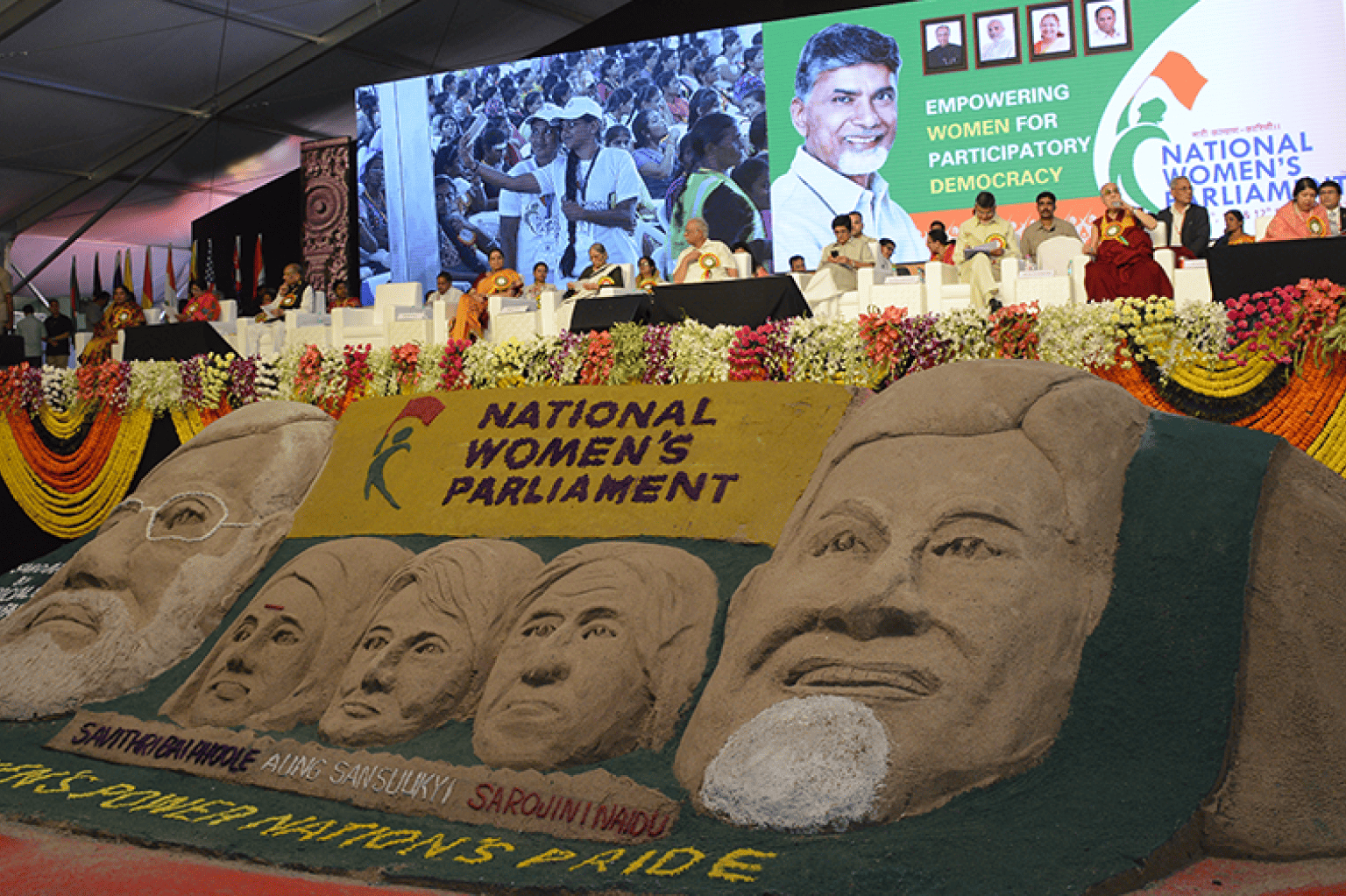
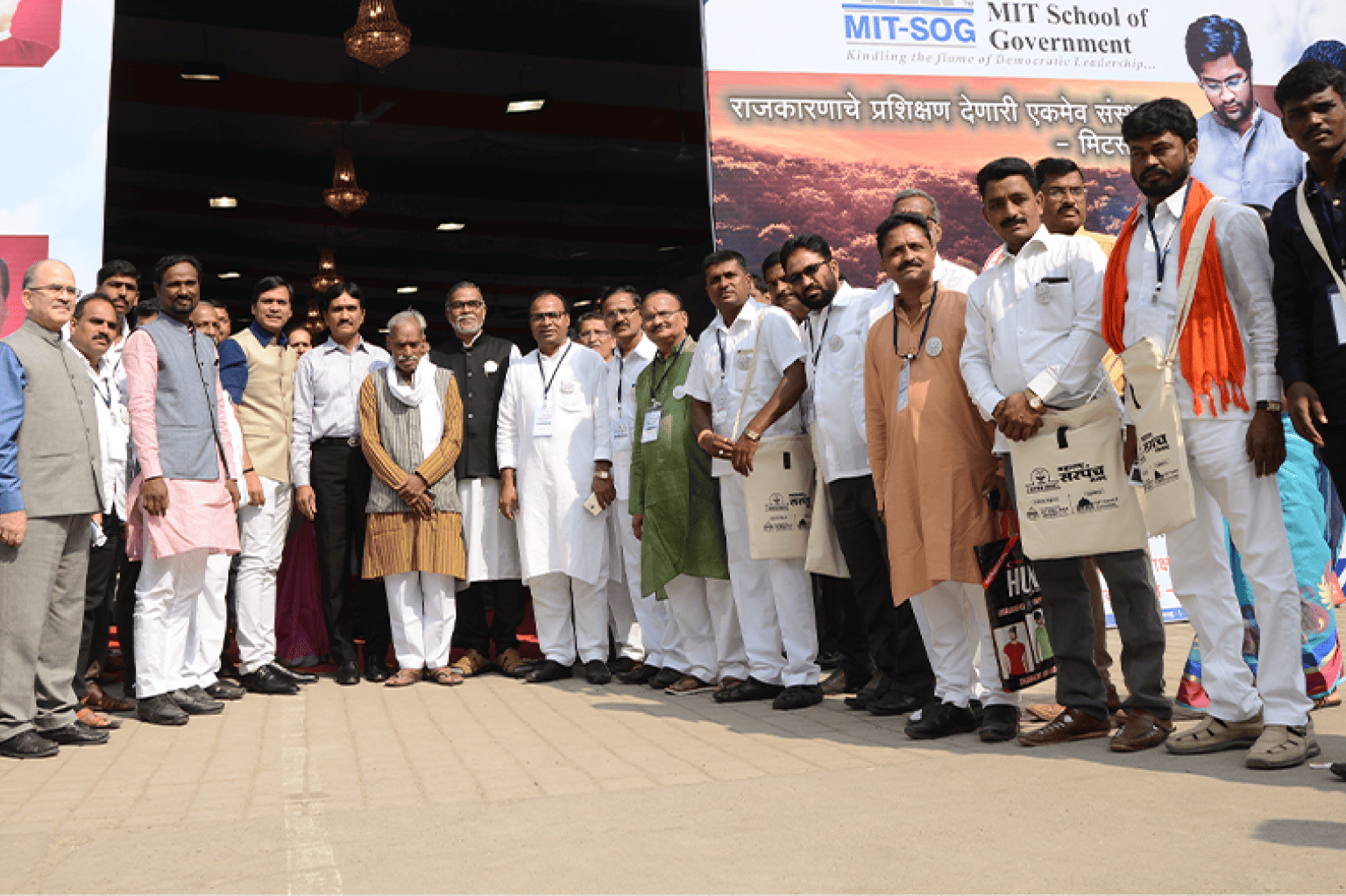
Rashtriya Sarpanch Sansad is a pioneering academic platform aimed at facilitating dialogues and exchanging information and knowledge related to local self-government. Despite seven decades of independence, many villages in Bharat still lack the infrastructure for daily living, making holistic development an urgent need.
To address these issues and equip future leaders with a deeper understanding of rural concerns, the Rural Immersion program is integrated into the academic curriculum of MIT WPU. Students can work in various villages, engage in direct interaction with villagers and Sarpanches, and gain a hands-on understanding of the challenges faced by rural communities.
Sarpanch Sansad takes this effort a step further by focusing on empowering Sarpanches and promoting open dialogues among all participants. The platform offers a unique opportunity for individuals to learn about positive initiatives and problem-solving efforts in their respective areas. This happens when they share their achievements and broaden their knowledge through exchange and discussion. Operating as a non-political platform, the Sarpanch Sansad is part of the organisation’s CSR initiatives. With a vision to bridge the gap between India and Bharat, and a mission to create more model villages, the Rashtriya Sarpanch Sansad is an initiative for growth.
The Bharat Asmita National Awards was established in 2005 by the MAEER’s MIT Group of Institutions in Pune, Bharat, to inspire future generations of leaders and people dedicated to the betterment of society through their contributions to nation-building. Over the years, it has gained significant prestige and recognition, and the selection committee takes great care to maintain the highest standards in selecting deserving individuals for recognition.
Conceptualised by Shri Rahul V. Karad and guided by Dr Vishwanath D. Karad, Dr Raghunath A. Mashelkar, and Dr Vijay P. Bhatkar, the Bharat Asmita National Awards promotes community service and sets an example for future generations. To date, 33 individuals have received the Bharat Asmita National Awards, each of whom has made a lasting impact on society through tireless work.
Highly competitive, Bharat Asmita National Awards has received over 15,000 nominations each year from various sources, including government officials, politicians, bureaucrats, media professionals, academics, non-government organisations, and more.
The mission of the MIT Group of Institutions extends beyond providing students with academic knowledge. The aim is to create well-rounded individuals who desire to make a meaningful impact on society, and the Bharat Asmita National Awards serve this vision. It is a way of recognising and inspiring individuals who have dedicated their lives to a greater cause. Through these awards, the youth of today are encouraged to follow in the footsteps of these highly deserving men and women, who have set an example of selfless service for the greater good.
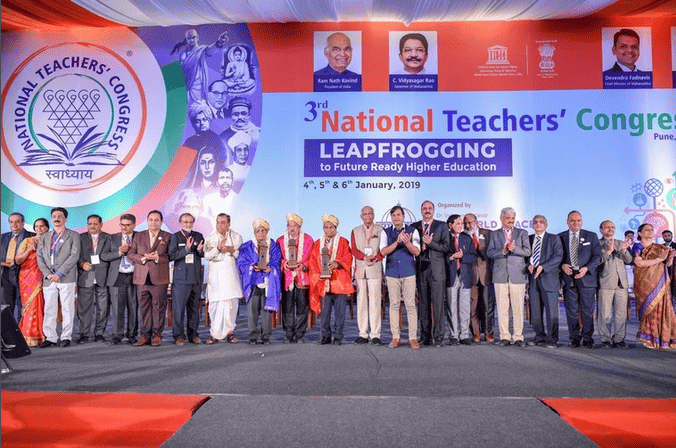

MIT School of Government, under the mentorship of Mr TN Seshen, former Chief Election Commissioner of Bharat, was established in 2005 to provide formal training to young individuals aspiring to make a career in politics. Founded on the belief that political leaders must provide effective leadership, regardless of their political ideologies, MIT-SOG encourages learning in civil service.
Each year, MIT School of Government conducts a National Level Felicitation Ceremony to recognise and honour the accomplishments of the successful candidates of the Civil Services Examination. To serve the country, aspiring individuals have to succeed in the challenging Civil Services Examination. MIT School of Government recognises the importance of this examination and salutes the youth who choose to pursue a career with a commitment to serving the nation.
This event is followed by interactive sessions with the aspiring youth, where they can discuss the challenges and opportunities ahead. This felicitation is a way of showing appreciation and faith in the system and its stakeholders. It has proven to inspire thousands of others who aspire to bring good governance and contribute to the nation through civil services. A small step in inspiring the youth to become true nation-builders of our democracy.
In 2011, the Founder Dean of the MIT School of Government, Rahul Karad, launched an innovative platform, the Bharatiya Chhatra Sansad (BCS) / Indian Student Parliament, inspired by the response to the MIT School of Government and sensing the need to take classroom learning to the country’s youth. This youth movement is dedicated to transforming society, nurturing youth dreams and their legitimate aspirations, building the nation, and fanning the flame of Bharatiya democratic leadership. The platform works to bring youth representation into mainstream political and social democracy, as well as to provide practical leadership training to prepare them to be future leaders of the nation.
Over the last eight years, the platform has captured the imagination and conscience of thousands of spirited young people and brought them together for a common goal: to strengthen the foundations of Bharatiya democracy. Every year, 10 to 12,000 politically and socially active higher education students from approximately 450 universities in 29 Bharatiya states attend this annual national conclave. A diverse range of political leaders, engaging thinkers, intellectual giants, industrial leaders, and youth icons of national and international renown provide students with context, analysis, courage, insight, and perspective to dream bigger, see clearer, and speak louder.
Such conclaves have taken place on a smaller scale in states such as Jammu and Kashmir, Bihar, Gujarat, and Madhya Pradesh. Interestingly, students who have attended it have become brand ambassadors for democracy, already paving their way to a brighter political and social future.
The BCS has the full support of UNESCO, the Union Ministry of Youth Affairs and Sports, the Government of Bharat, the Ministry of Higher and Technical Education, the Government of Maharashtra, the Ministry of Sports and Youth Welfare, the HBS Club of India, and the Tata Institute of Social Sciences.
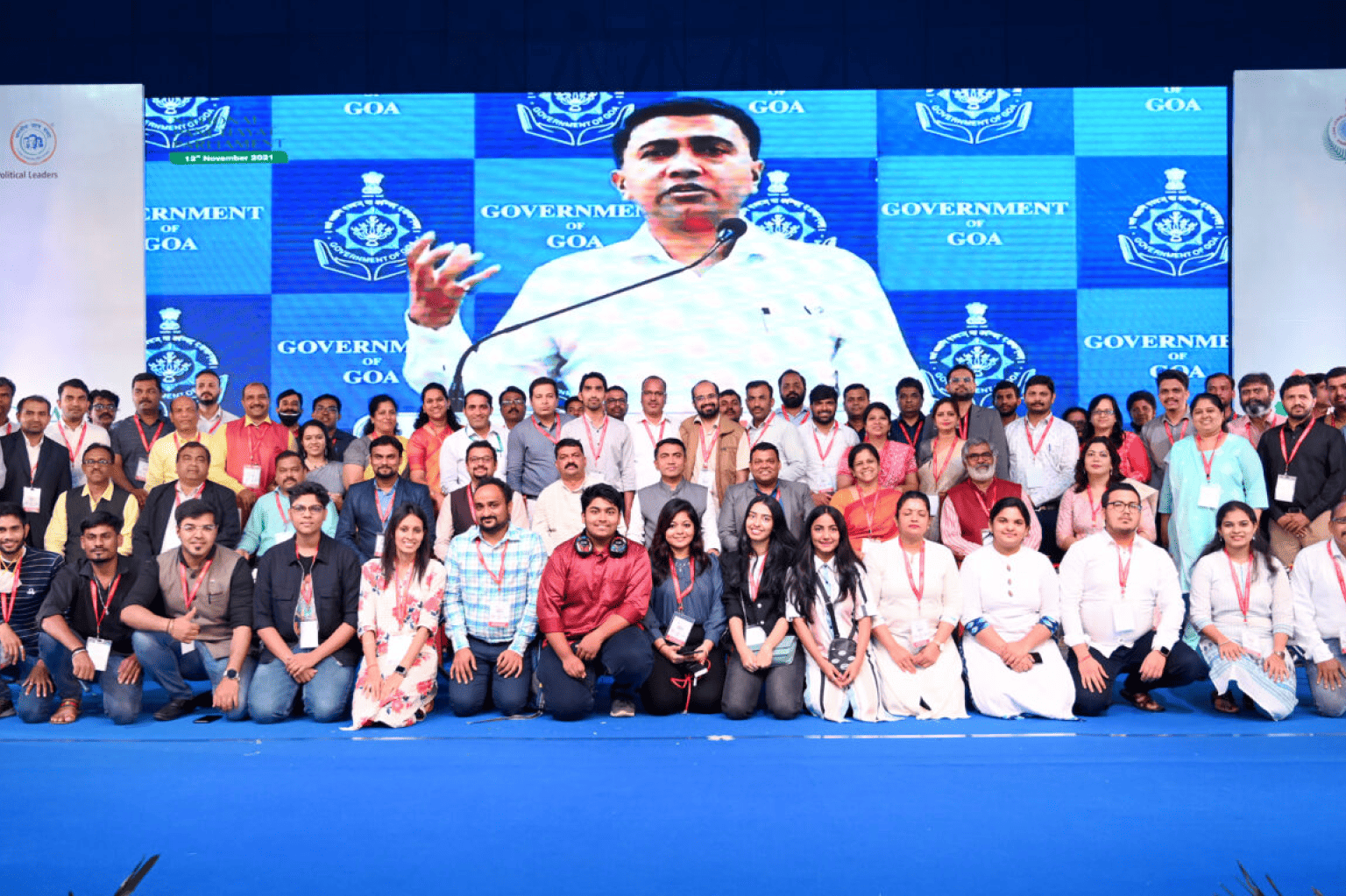
Festival on Democracy is a celebration commemorating the commendable feats achieved by the state and its legislative assembly since its existence. The representatives of the people who have strived to bring a change and have successfully culminated their thoughts into policies and movements that have transformed the idea of that specific geography are acknowledged so that they never lose their importance over time.
The Kerala Legislative Assembly and Goa Legislative Assembly have independently collaborated with the MIT School of Government to host the Festival on Democracy events in 2019 and 2021 respectively.
India, being hailed as the ‘Mother of Democracy’, has opened the gates of motivation for Indians to retrospect the journey which has brought them all to this juncture.
MIT- SOG aims at inspiring the Indian youth to reassess their role and contribution to the betterment, growth and advancement of the governance as well as the democracy of the country.
While the connect with spirited youth happened through the BCS, Rahul decided to take the cause further and started thinking about something that would reach out to those who influence the youth largely. Rahul believed that great teachers help create great minds. Teachers have always played crucial role in motivating students to contribute to shaping the ideals of the nation and to contribute to its development. It is the innate nature of our country to churn out one success story after other of the Guru Shishya Parampara from all walks and streams of life. Thus, after rumination, he came up with this novel concept of The National Teachers Congress (NTC) in 2016.
NTC is aimed at igniting the spirit of thousands of teachers every year so that they continue to look beyond the commercial temptations of the jobs they do and create a deeper and wider impact on society through this noble profession. Rahul firmly believes that as we are fast moving towards the Knowledge Era, the NTC will benefit all the important stakeholders of the Education Process including Students, Teachers, Parents, Industry, Law Makers and Society at large.
The first NTC held in 2016 was a resounding success with over 9000 spirited, socially sensitive and active College Teachers participating in the program to understand various national issues, the challenges faced and solutions to those challenges to imbibe the various inputs among the students and educate the society to create a knowledge-driven holistic nation. The second edition of the NTC which concluded recently was a huge success with participation not just from within the country but also from several foreign countries.


The year 2018 saw Shri. Rahul V. Karad Ji venturing into a territory which otherwise would not attract the fancy of anyone. His vision that the actual growth of any country lies in its hinterlands prompted him to bring Village leaders from Maharashtra (Sarpanch) under one roof. This led to the organising of the first MIT Maharashtra Sarpanch Sansad.
It is a unique initiative to bring Sarpanchs, Government, Media and Experts for the Vision of Rural Development. Sarpanchs are key officials between the Centre, State Government and Villagers. As per a new Act Sarpanch are elected directly from Voters. Continuous trainings are necessary for empowering Sarpanch, which is the main objective of the Maharashtra Sarpanch Sansad.
The Sansad aspires to create Model Villages at every Taluka (Block) level. These Model Developed Villages would be on the lines of decentralization of power and Rural Empowerment as proposed by Mahatma Gandhi. These villages will in turn act as Role Models for the growth of other less developed villages in the vicinity.
Adding {{itemName}} to cart
Added {{itemName}} to cart